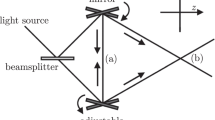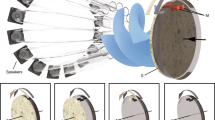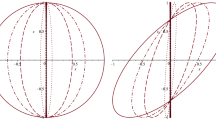Abstract
ALTHOUGH all experiments of the type of the Michelson experiment (with the exception of Miller's experiment) have shown that the second-order effects predicted by classical (non-relativistic) optics as results of an ‘æther drift’ do not exist, no experiments seem to have been carried out for testing whether such second-order effects could not be detected with standing electromagnetic waves. In view of the fact that the frequencies of microwaves in the centimetre region can now be measured with extraordinary accuracy, such waves could be used for this purpose with great advantage.
This is a preview of subscription content, access via your institution
Access options
Subscribe to this journal
Receive 51 print issues and online access
$199.00 per year
only $3.90 per issue
Buy this article
- Purchase on Springer Link
- Instant access to full article PDF
Prices may be subject to local taxes which are calculated during checkout
Similar content being viewed by others
Author information
Authors and Affiliations
Rights and permissions
About this article
Cite this article
FURTH, H. Proposal for a New Æther Drift Experiment. Nature 173, 80–81 (1954). https://doi.org/10.1038/173080b0
Issue Date:
DOI: https://doi.org/10.1038/173080b0
This article is cited by
-
Proposal for a New Æther Drift Experiment
Nature (1955)
-
A New Æther-Drift Experiment
Nature (1955)
-
Proposal for a New Æther Drift Experiment
Nature (1954)
-
Proposal for a New Æther-Drift Experiment
Nature (1954)
Comments
By submitting a comment you agree to abide by our Terms and Community Guidelines. If you find something abusive or that does not comply with our terms or guidelines please flag it as inappropriate.



